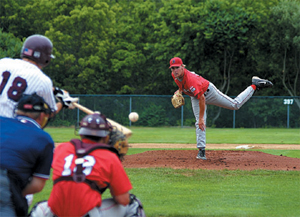|
22 July, 2004 |
 |
|
|
A touching look at the Cape League
It has been celebrated as a conduit for young men on their way to the major leagues, but the true glory of the Cape Cod Baseball League is that it gives the players and their fans the opportunity to experience what baseball was like before million-dollar contracts and $50 seats put the game out of reach.
|

Cotuitís scenic Lowell Park field is the backdrop for this recent Kettleers vs. Bourne Braves game.
Photo by Bill Delorey
|
Living with local families and working for local businesses, the amateur athletes who come to Cape Cod every summer don't just play for a town, they become a part of the town. As such they become accessible heroes, whose celebrity is balanced by life in the workaday world.
"Touching the Game," a newly released full-length DVD documentary, tells that story from the perspective of the players, the league volunteers, the host families, the fans and the major leaguers who got their start on Cape Cod.
The DVD is being sold at Cape League ballparks. It will be aired 8 to 10 p.m. Friday on WLVI-TV (channel 56). The documentary was created by Fields of Vision and Eye Candy Cinema. Jim Carroll, producer, writer and editor of "Touching the Game," said that he went into the project without any preconceptions.
"We said we're just going to ... go where the story takes us. We lucked out. We got some great human interest stories," Carroll remarked.
Matt Cooksey and Jeff Palumbo, who came to the Cape from George Mason University in Virginia, give the film its main story line. The two, who have played together since Little League, are placed on opposing teams - Bourne and Orleans - and meet for the 2003 league championship. By looking into their past as well as their present, and following them on and off the field, we see the path that has brought many of these athletes here, what their hopes are and the challenges they face in reaching their goals.
One in six Cape League players make it to the pros and currently there are more than 200 Cape League graduates playing in the big leagues. Nomar Garciaparra, Jeff Bagwell, Frank Thomas and Barry Zito are among the current stars who reminisce about their Cape League experience, as does former Red Sox star Mo Vaughan. Interviews were conducted in Arizona and Florida during spring training. Carroll said they didn't have difficulty gaining access to the players.
"Just about everyone loved the Cape League so much that they were willing to talk about it," Carroll said.
But it isn't simply the talent of the players that that makes the towns take pride in their teams, it's their character as well.
"I think that's important to most of the towns," Carroll said, adding that message gets through to the players.
"The kids know this is their chance. They know if they get in trouble the scouts will probably hear about it," Carroll said. "They're going to take this seriously. This is not a summer vacation. I was very impressed with how mature the kids were."
That quality of character comes through in the film, particularly when watching the players waving to the crowd at a Fourth of July parade or conducting a baseball clinic for local youngsters. Those images were welcomed by those who were bothered by how the league was portrayed in "Summer Catch," the 2001 film which told the story of a fictional romance involving a Cape Cod League player.
"There were some people that thought it might not have displayed the league in a good light. Maybe a little more partying than usual," Carroll said.
Among the most poignant motions of "Touching the Game" are those involving Arnie Allen, a Cape League volunteer for 46 years, who died of cancer at the age of 53. The Falmouth Commodores, the team to whom he was devoted, renamed their field in his honor, a clear and fitting contrast to the corporate naming of many major league parks.
It is that sense of community that makes the league what it is, a quality that Carroll sees as very much alive and thriving.
The volunteers are just as passionate as always," Carroll said.
If anything, he sees the challenge as keeping it from getting too big and everybody wanting to be a part of it.
"They want to keep that Norman Rockwell feel about it."
By Joe Burns
jburns@cnc.com
|

